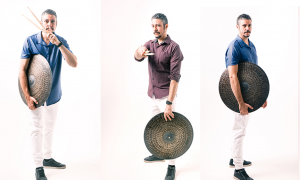Home » Jazz Articles » Interview » Archie Shepp: Knowing the Life
Archie Shepp: Knowing the Life
It was my peers who really helped me--and one of the things Lee Morgan liked about me was the fact that, even though I couldn
 Saxophonist, pianist, writer and composer Archie Shepp was born in Ft. Lauderdale, Florida May 24, 1937 and grew up in Philadelphia playing with hard-bop luminaries such as Lee Morgan and Bobby Timmons. A move to New York in the 1960s and early gigs with Cecil Taylor aligned him with the avant-garde, leading to work with John Coltrane and a recording contract for Impulse!. Shepp's travels have taken him to Africa and Europe and his musical engagements have been diverse, capturing a range of the modern Afro-American experience.
Saxophonist, pianist, writer and composer Archie Shepp was born in Ft. Lauderdale, Florida May 24, 1937 and grew up in Philadelphia playing with hard-bop luminaries such as Lee Morgan and Bobby Timmons. A move to New York in the 1960s and early gigs with Cecil Taylor aligned him with the avant-garde, leading to work with John Coltrane and a recording contract for Impulse!. Shepp's travels have taken him to Africa and Europe and his musical engagements have been diverse, capturing a range of the modern Afro-American experience.All About Jazz: I'd like to start by discussing your latest projects and what you're working on now.
Archie Shepp: Basically now I'm writing music for films and I hope to complete that project eventually. I've started a record label called Archieball and I just put out a recording with Chuck D. It's a double album that also features Claudine Myers, Cameron Brown and Ronnie Burrage, and my own group with Steve McCraven and Wayne Dockery.
AAJ: That sounds like a diverse setup.
AS: Well, Chuck happened to be in Paris, and through a friend of mine, I played a concert with Public Enemy. After the performance that night, I told him I'd just started recording and would be very happy if he'd do something on the record, which he did and he didn't ask for any money or anything. He came in and improvised lyrics and I think it's quite good. Chuck's a good guy and I think Public Enemy's music says something—it tells something about society and engages these problems.
AAJ: Right, and with my limited experience of hip-hop—as a kid listening to Public Enemy, NWA and so forth—it seems like the political aspects of it have become more and more limited.
AS: I think so. It's probably also due to the changes that are going on in our society. Chuck is around fifty, and the kids who are recording today are coming out of a whole different set of values.
AAJ: More ephemeral, perhaps.
AS: Certainly more ephemeral, and not concerned with social, economic and aesthetic problems. That's not a put-down of these guys; they really continue an essentially blues continuum. Rap is really just a continuation of the blues from a textual and verbal point of view. African-American music is as rich, verbally—coming from folktales and folklore—blues and that lyric idiom could be considered a kind of poetry. The rappers are really an extension of the blues man, which is of course the preacher.
AAJ: Right. Poet Don Lee's first record was called Rappin' and Readin' (Broadside, 1970). I can see the extension and there is a lot of confusion that pertains to rap music as literature.
AS: That's what I'm getting at. But I think the name is unfortunate; if you take a more ethno-musicological perspective, we don't have to use more popular terms like "rap. I think actually—and this is why I made the analogy with a preacher—this is an extension of the African-American vocal-dance tradition, just like so-called "jazz music is the evolution of the instrumental aspect of that tradition, which frequently corresponds.
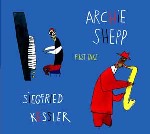 For example, the so-called "jazz singers like Billie Holliday and Ella Fitzgerald were frequently compared with horn players or instrumentalists. The so-called jazz vocalists are not singing in the tradition of Michael Jackson and Stevie Wonder; they're singing in the tradition of instrumental performers, bending notes and singing notes to chord changes and so on, vis-à-vis Little Richard, who reinforces a much earlier tradition—the hot, the cry, the holler, the work song, the spiritual. Those are related, but in some ways quite different.
For example, the so-called "jazz singers like Billie Holliday and Ella Fitzgerald were frequently compared with horn players or instrumentalists. The so-called jazz vocalists are not singing in the tradition of Michael Jackson and Stevie Wonder; they're singing in the tradition of instrumental performers, bending notes and singing notes to chord changes and so on, vis-à-vis Little Richard, who reinforces a much earlier tradition—the hot, the cry, the holler, the work song, the spiritual. Those are related, but in some ways quite different.
AAJ: I think some of the confusion arises when the contexts of instrumental and vocal music are put together, and people don't know how to experience that—whether the text comes first or whether the instrumental factor comes first.
AS: Especially with African-American music, for example we can distinguish between secular music and religious music. When I was teaching I had a discussion with one of my white students who attended a black church. She told me they were dancing to the music. I said, "Well, you know, the religious dance is different from the secular dance. You may be doing the hip-hop dance to a Mahalia Jackson song, but the values and meaning of those songs are entirely different from a song that's being sung by Bobby Bland or someone else.
A good example of that is Ray Charles, or Aretha Franklin, both coming out of a heavy gospel tradition and Ray was criticized by some in the black community, the religious part of that community, for bringing Negro religious music over to, or confusing it with, black secular music. For example, using diminished chords—songs like "Drown in My Own Tears are really gospel-style music because they use 6/8 or 12/8 rhythm and diminished chords. You don't find that much in so-called jazz music.
AAJ: It produces some interesting results, but I understand that it could be viewed in some circles as blasphemous.
AS: Well, I think that it's a cultural thing. The African-American religious experience takes a direction of its own; there's a whole body of music connected with it and a meaning attached to that which has socio-political implications. For example, the slave songs that sung about going to Canada that had double meanings—whether they were singing about going to heaven. "Follow the Blinking Light told slaves how to follow the North Star to Canada. It's not a spiritual, but it was a folk song that was used during the time of slavery.
The one they said Nat Turner wrote, "Steal Away —"steal away, steal away / steal away home / I ain't got long to be here —the whites who heard it were thinking one thing but the blacks were singing of another world, dying and going to heaven. It was a code song used by Nat, some people say, which was used as a signal for when it was time to rise up. This music has a popular basis, which I call "vocal-dance and an instrumental aspect that is popularly known as jazz.
AAJ: Not only that, but it has a deep history of double meanings within its texts.
AS: Absolutely, and the connection between its two forms is profound because without the one, you wouldn't have the other.
AAJ: In light of saxophone players who were involved in the advances of the sixties' music, "free jazz or however one chooses to characterize it, the idea of preaching from the horn gives a revelatory aspect to some of the music.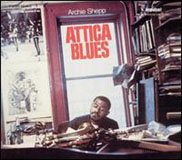 AS: That was basically true of John Coltrane, who really articulated basically that—that he was a preacher on his horn, and he talked about that in an article called "The Black Composer Speaks that was put together in a compilation of interviews by David Baker at the University of Indiana.
AS: That was basically true of John Coltrane, who really articulated basically that—that he was a preacher on his horn, and he talked about that in an article called "The Black Composer Speaks that was put together in a compilation of interviews by David Baker at the University of Indiana.
Trane speaks very movingly about the time when he left Miles and thought that God had taken the gift of music from him. He said to God that if He would give him back the gift, he would become a preacher on his horn. That's exactly how he put it, and I think Albert Ayler is close to that same kind of spiritual identity. Perhaps technically not the same man as Coltrane, but the feeling of the songs and his meaning—he's a very special saxophonist. That's why Coltrane felt that identity with Albert and thought that he was on to something.
AAJ: And the scenario at that time was interesting insofar as the music also served very secular political ends, or was viewed by some as such, as well as an intense spiritual connection. At that time you were right between those areas; how would you characterize the differences or that setting?
AS: Well, I feel like I'm a bluesman. I started playing the blues when I was a kid. When I first started to play professionally it was with a blues band, with young kids, and it was always something I had an affinity for. My father played the banjo and he sang a lot of blues, so it was something that came to me the way some people play Mozart and Beethoven. I grew up listening to "St. Louis Blues and "Lazy River and stuff my dad was playing on the banjo.
When I finally met people like Lee Morgan, Clarence Sharpe (C Sharp, an alto saxophonist), I didn't know much about chords but I already knew the blues, and that's one thing that helped me to get into the circle of musicians as easily as I did. Lee Morgan, who was one of my first mentors (we're basically about the same age; I'm a little older than Lee), he was already playing very well when he was fifteen or sixteen.
People like that were very helpful to me at that point, and it was my peers who really helped me—and one of the things Lee liked about me was the fact that, even though I couldn't play many chord changes, as a young man I could play the blues. This is how I began to learn chord changes, from Lee and some of the piano players like Timmons, because my blues was fairly good. The blues is a very important aspect of this music, and I consider myself basically a blues player.
AAJ: There's a bit of a period where you were at Goddard College studying theater, and I've always been intrigued by your relationship with literature and theater as you were coming up and subsequently. Could you talk about how poetry and theater were intertwined with the music for you?
AS: To tell the truth, when I went to college my initial ambition was to become a lawyer. I wanted to study law, and my first few years were crammed with political science and those kinds of courses. From the time I was a young child, I was very aware of the problems my people faced socially, politically and economically, and I was made aware by family and hearing my father in discussions with his friends, so that the connection between politics and music was not that difficult for me to make. When I played the blues, I didn't know many chords or notes to play, but they were real notes and they came out of my experience, out of my blues and my soul. That's something that you can't teach anybody. So, making that connection between words and music was not difficult.
More specifically, when I was in college I began to listen to poetry by people like Ezra Pound and Eliot on vinyl recordings. I had never thought—not in my wildest imagination—of people putting words on records. In my third year, I encountered a playwright, Joe Rosenberg, who was very important for me in terms of choosing which way to go and what my options at that point were. He read a short story that I wrote and told me, "You could write plays. Your dialogue is quite good.
Again, that's what universities are for, to awaken the possibilities that you haven't dreamed of. For a young black kid who had come straight out of the ghetto into college (I was on full scholarship), I had thought of going into law because at that point I was driven by my own sense of social engagement and doing something for my people. Joe opened up another door for me—"yeah, there's your people but you've got to think about yourself. So for the first time, my Black Nationalism began to open up, and my sensibilities—I'm not only a person, but a man.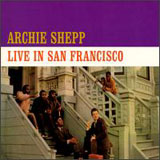 AAJ: And a creative person.
AAJ: And a creative person.
AS: All kinds of possibilities were open to me—law, where I could help people, or I could be a writer, which I'd never thought of. There were no writers where I grew up. People danced and sang, they played "jazz, and that was legitimate. Maybe we didn't even know how rich and beautiful and important what we were doing was. (The term doesn't really say much—it's like Kleenex or Marlboros) But when he said to be a writer, it opened up an entirely new world for me.
So when it was time to choose my major in my third year, instead of doing law, I wanted to be a playwright. That's what I got my degree in, dramatic literature, and I continued to play the saxophone every day. When I wasn't working on my studies, I was playing music. So that connection between words and music, and ideas, has always been there—it's a central aspect of my artistic content.
AAJ: My experiences listening, going back to that group you had with Beaver Harris and Roswell Rudd, something like Live in San Francisco (Impulse!. 1966), all the way up through Attica Blues (Impulse!, 1972) and past that point—granted, they're recordings, but what I gather is that in performing a live concert there's a programmatic aspect to it, almost like a play.
AS: Well, you know, I've always felt (since my days when I began to get into theatre and write plays, and before that I did a lot of acting in college) my concept as being more Athenian in the sense that I began to see the stage as a place where something happens. That was the Greek concept of the stage as a place where something is done, so in that sense I began to see that I could use elements of that in my own work.
For example, poetry and things like that which I'd never dreamt of using. In that regard, things like the poem "Mama Rose or "The Wedding, they were actual attempts to combine music and poetry. I consider that as an early example of "rap, and of course that can (and did) take many directions, as young people today are caught up in the rhyme playing to the drumbeat. In fact, we could go back to Langston Hughes and Duke Ellington's "Black Musique, a kind of dialogue over rhythm, and these are early examples of "rap. Then you enter into the African verbal tradition, and you can easily make connections between that and what evolved in the United States.
AAJ: In light of that, how did it carry over in your experience of the Pan-African Festival and going over to Algeria?
AS: That's where we went first, and we went on to the Ivory Coast, Senegal, Morocco and places like that. That was really quite an experience for me. By that time Trane had opened a lot of doors, into things with Ravi Shankar and Olatunji which were very inspiring to me— Africa/Brass (Impulse!, 1961) and those things—and he made those connections between traditional African music and African-American music. This was true especially when Trane began to open up the modes, which correspond very closely to ragas and the pentatonic scale.
So, by the time of the 1960s, it was clear that Coltrane had opened the door to "world music. It followed Coltrane, because before that there weren't many experiments between so-called jazz musicians and people outside their own idioms.
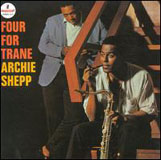 My going to Africa, by the time I went, I was really ready to engage that music and I understood what was possible. I had to evolve as a musician in order to technically take more advantage of this music (I still am evolving), and I'm very comfortable now playing without a piano or only a drum, and I have exactly the same feeling as I would in a village playing a sacred hymn.
My going to Africa, by the time I went, I was really ready to engage that music and I understood what was possible. I had to evolve as a musician in order to technically take more advantage of this music (I still am evolving), and I'm very comfortable now playing without a piano or only a drum, and I have exactly the same feeling as I would in a village playing a sacred hymn.
AAJ: When you were first in Paris, one thing that struck me was that you had developed some connections there with a lot of the older bebop players—expatriates or otherwise—like Philly Joe Jones. From my reading, it seems like people tried to paint a picture of there being two camps at odds, at least in New York.
AS: On the contrary, as I said, all my early experience was around people in Philly—Lee Morgan, Ted Curson, Timmons (primarily with Lee, because he was a good friend)—and that's all we played. "Sippin' at Bell's, "Confirmation, and Lee was really playing those songs at that time [chuckles].
The reason I'm identified at all with avant-garde music is because of Cecil Taylor. When I came to New York, I had never conceived of myself as playing that type of music; I didn't even like it, and the first time I heard Ornette I wasn't that impressed by what he was doing. I was totally committed to chord-change music, and it was only by chance that Cecil identified me on the streets of the West Village and asked me to record with him. He really didn't even know me; his bassist, Buell Neidlinger, had suggested me.
We became very good friends and colleagues and Cecil was very important to me, again like Coltrane opening up other directions, even intellectually because Cecil was not only very well-read, but his ideas were very cogent and imaginative. For example, one day he was talking about the piano (you know, he'd studied dance), and he said, "Sometimes I feel like my hands are dancers on the keys, and that was an image I'd never conceived.
Frequently, he made me aware of just how intelligent this music is and how intelligent some of the people are who play it and how important it has been to African-Americans in terms of our liberation and our struggle. So, Cecil Taylor was a very important guy to me, certainly musically because the first time we played, I didn't play chords with him. That's when my avant-garde career began, but actually they used to call me "Big Foot because all I could play was the blues. It's ironic that so many people don't think I played the blues, and that I arrived at my own tradition rather late. It's just the contrary.
AAJ: Also that part of your career where you engaged more avant-garde forms was, on the whole, rather short. AS: Well, relatively—but I wouldn't say so short because the eight or ten years I was with Impulse!, that's pretty much all I did. During that time, I took advantage of having a budget and hired the best musicians around New York. I never limited myself to a style of music, avant-garde and so forth because I've always liked traditional music, so-called jazz music, standards and the works of Ellington (I recorded Duke Ellington's songs alongside my so-called avant-garde originals).
AS: Well, relatively—but I wouldn't say so short because the eight or ten years I was with Impulse!, that's pretty much all I did. During that time, I took advantage of having a budget and hired the best musicians around New York. I never limited myself to a style of music, avant-garde and so forth because I've always liked traditional music, so-called jazz music, standards and the works of Ellington (I recorded Duke Ellington's songs alongside my so-called avant-garde originals).
AAJ: And there were things even more far-reaching like Attica Blues.
AS: Yeah, things like that on which I'm really trying to make contemporary and make relevant my blues direction and my interest. I did record a number of blues items including that one. I recorded something with Woody Shaw later on for Impulse! [For Losers (Impulse!, 1971)], on which we did a number of blues-type songs.
AAJ: Has it been fairly difficult since that time to get together the groups you've wanted for certain projects?
AS: You know, this business is generational—another reason I don't like the term "jazz is because it's topical. It always refers to what's—or who's—currently on top. Giving five stars or four stars, there's no sense of retrospect, of what came before and really how important that is. The fact that we really do have a classical tradition; Ben [Webster], Don [Byas], Coleman Hawkins, Sidney Bechet or Louis Armstrong represent my classical musicians. Some people call it "classical jazz, but it's really the roots of this music and ingeniously evolved the folk music into fine-art music.
Thank you to Archie Shepp, Monette Berthomier and the staff at All About Jazz New York for making this interview possible.
Selected Discography
Archie Shepp, First Take (Archieball, 2005)
Archie Shepp and Max Roach, Force (Uniteledis, 1977)
Archie Shepp and Horace Parlan, Goin' Home (Steeplechase, 1977)
Archie Shepp, Attica Blues (Impulse, 1972)
Archie Shepp and Chicago Beau, Black Gipsy (America-Universal, 1969)
Archie Shepp, Live in San Francisco (Impulse, 1966)
Archie Shepp, Four for Trane (Impulse, 1964)
The New York Contemporary Five, In Europe (Sonet, 1963)
Bill Dixon and Archie Shepp, Quartet (Savoy, 1962)
Cecil Taylor, The World of... (Candid, 1960)
Photo Credits
Top Photo: Hans Speekenbrink
Bottom Photo: Madli Liis Parts
Tags
PREVIOUS / NEXT
Support All About Jazz
 All About Jazz has been a pillar of jazz since 1995, championing it as an art form and, more importantly, supporting the musicians who make it. Our enduring commitment has made "AAJ" one of the most culturally important websites of its kind, read by hundreds of thousands of fans, musicians and industry figures every month.
All About Jazz has been a pillar of jazz since 1995, championing it as an art form and, more importantly, supporting the musicians who make it. Our enduring commitment has made "AAJ" one of the most culturally important websites of its kind, read by hundreds of thousands of fans, musicians and industry figures every month.













